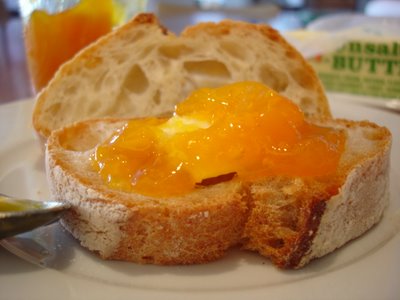
Ok. I’m back. Time to resume non-canine activities. I was thinking about which recipe to post this week and thought I’d post one that you can enjoy for a long time . . . jam!
I took a canning class at the Culinary Institute recently. The average age of the class was rather high – I guess canning is an old fashioned and somewhat quaint pursuit. I have always been interested in canning – more for the endless gift-giving opportunities it affords than for preserving out-of-season items, but have not tried it for fear of poisoning my gift recipients. It seems improper canning could easily result in botulism and lead to certain death – oh my! So I took a class to learn proper methods and handling and am now cautiously optimistic about my ability to impart joy without harm.
I always thought canning required a lot of equipment and space, but actually you need relatively few items – at the most basic level, proper canning jars and lids and a pot large enough to fill with enough water to cover the jars by several inches. We concentrated on canning high-acid foods (pH value 4.6 or lower) which require heat processing to 212 degrees Fahrenheit and can therefore be processed using a simple boiling water canner for a specified period of time. Low acid foods must be processed at temperatures of 240 degrees Fahrenheit to destroy harmful bacteria and follow an entirely different process which is more involved and was not covered in our class. High-acid foods include fruits, jams, jellies, pickles, relishes, chutneys, vinegars, etc.
Canning requires precisely following a strict set of directions that cannot be altered by the novice. This means adhering to the exact sugar content and jar size specified in the recipe as both are exactly related to the processing time specified.
I recently read a great blog post on the process on Andrea’s Recipe Box which I will reference so as not to repeat the same information available there.
Apricot Jam
(Makes about 4 pints)
2 cups dried apricots, roughly chopped
¼ cup lemon juice
2 cups granulated sugar
Combine fresh apricots, dried apricots and lemon juice in a large pot over medium heat. Gradually stir in sugar and increase heat to high, stirring frequently until thick. Ladle hot apricot jam into hot jars, leaving ¼ inch headspace. Remove air bubbles, adjust lids and process 15 minutes in boiling water canner.

















2 comments:
Glad you and yopur recipes are back. The apricot jam sounds delicious and your photo of it is superb. Your recipe doesn't appear to be too difficult so I may give it a try. But I have a question. Could Splenda be substituted for the sugar for those of us who have to keep a careful eye on the amount of sugar we consume? Thanks.
You could definitely swap in splenda if you don't plan on canning. I would not dare suggest that you could safely do that if you do. You should check one of the USDA sites: http://extension.usu.edu/files/foodpubs/cangui1b.pdf or http://www.uga.edu/nchfp/publications/publications_usda.html or with your local COOP for guidelines.
Post a Comment
Thank you for submitting a comment. I love, love reading your comments - they motivate and inspire me. Typically I try to come back and respond to your comment. Forgive me if occasionally I don't. Thanks for dropping by! (p.s. please don't leave marketing messages here)